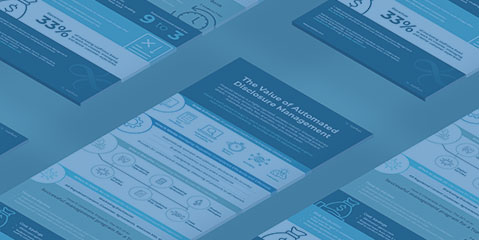With banking, and banking regulations, undergoing such a transformation in these past couple of years, keeping track of what’s working, and why, is vital. So too is finding the right people to tap for that information. As much as I enjoy sharing knowledge, and connecting our client partners with technology solutions, I’m finding myself seeking out others from whom to gain perspective on this dynamic industry.
 Asking questions of industry leaders with learned wisdom and fresh insight provides all of us with valuable knowledge. Having had the opportunity to do just that recently, we’re excited to share a high-quality, high-level discussion I recently had with Brent Bahnub, CEO and Founder at Apogee Process Improvement. First, a summary of who he is and where he’s been to better appreciate what he knows.
Asking questions of industry leaders with learned wisdom and fresh insight provides all of us with valuable knowledge. Having had the opportunity to do just that recently, we’re excited to share a high-quality, high-level discussion I recently had with Brent Bahnub, CEO and Founder at Apogee Process Improvement. First, a summary of who he is and where he’s been to better appreciate what he knows.
Before becoming the CEO and Founder at Apogee, Brent was the Managing Director and Control Officer Executive at JP Morgan Chase. He has held positions at First Niagara, National City Bank, and has written a book, Activity-Based Management for Financial Institutions. He has co-authored four patents, and holds an MBA from Columbia Business School. That’s quite a solid record of accomplishment. His background underscores why I was pleased to sit down with him for a deep dive discussion on doing disclosures well, and why.
Brent graciously offered his expertise in answering focused questions on financial services – banking regulations and disclosures – hot and timely topics today. For Naehas, it hits home, and one for which technology is fast-becoming a critical cog in the risk and compliance wheel: disclosures.
In our newest Naehas Spotlight Series, I’ll be sharing Brent’s answers and actionable insights to specific questions on disclosures, and on broader issues of banking regulation. You’ll want to see the full interview here:
What are the top 5 wrong ways banks are going about disclosures? What do you see are the main ways banks are doing disclosures incorrectly?
 The first one is that many banks do not have a definition of what a disclosure is. We call that using a lower case d for disclosure: anything I say is a disclosure. In our world, a disclosure is content that is required to be communicated by law, by reg or by rule. There are also no standards. So I would place the no definition and no standards into one bucket.
The first one is that many banks do not have a definition of what a disclosure is. We call that using a lower case d for disclosure: anything I say is a disclosure. In our world, a disclosure is content that is required to be communicated by law, by reg or by rule. There are also no standards. So I would place the no definition and no standards into one bucket.
Secondly, there is limited ownership at most financial institutions of the disclosure. Oftentimes, people will try to say that compliance owns the disclosure, but regulators have been fairly clear in saying that compliance is not the owner, they are not the first line of defense. It has to be the business that owns the disclosures.
Third thing is that they (institutions and teams managing disclosures) are not linked to those laws, regs and rules, so they do not know why they are saying it. But those laws, regs and rules have obligations, and that is why you are making the communication.
 Another issue on ways banks are doing disclosures incorrectly is traceability, and, broadly, the lack of it. Particularly out to the bank’s communications. If anyone had to live through the LIBOR language changes, this should be relatively fresh in their minds. To be able to find where you are using that term (which is a disclaimer not a disclosure), follows a similar pattern: if you had to look at all contracts and all various areas where you used the word, you would understand. I know banks where it was a 6-month effort to find that language. If you have traceability that should take minutes, not months. It is fundamental that you have traceability from an operational, execution, and maintenance end, which is lacking for banks in most places.
Another issue on ways banks are doing disclosures incorrectly is traceability, and, broadly, the lack of it. Particularly out to the bank’s communications. If anyone had to live through the LIBOR language changes, this should be relatively fresh in their minds. To be able to find where you are using that term (which is a disclaimer not a disclosure), follows a similar pattern: if you had to look at all contracts and all various areas where you used the word, you would understand. I know banks where it was a 6-month effort to find that language. If you have traceability that should take minutes, not months. It is fundamental that you have traceability from an operational, execution, and maintenance end, which is lacking for banks in most places.
Fifth and finally, banks are generally not paying attention to the customer complaints related to disclosures. They are not categorized in any special way, and banks which do not have a common collection spot. Basically, banks are not breaking out disclosures to realize the risk that is lying right there. For every dissatisfied customer with a disclosure issue, somebody is going to bring that to the attention of the regulators, and then you have a real finance problem on your hands.
Top 5 Mistakes in Banking Disclosure Process
- No definition of what a disclosure is
- Limited ownership of the disclosure
- Little linkage as to the “why” of disclosures in communication
- Lack of traceability
- Not paying attention to customer complaints
Keeping up with banking regulations, improving disclosure processes, and focusing first on the customer experience will help banks better communicate to meet the needs of customers and regulators.






